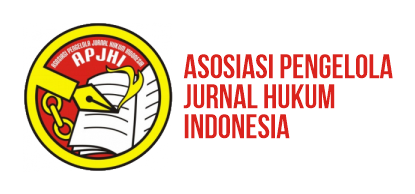Legal Protection for Victims of Illegal Investment through Loss Recovery
Main Article Content
Yusuf Wahyu Prayudha*
The fast expansion of digital asset trading, especially in cryptocurrency, comes with considerable dangers due to unpredictable market fluctuations and uncertain regulations, resulting in a rise in illegal investment scams and substantial losses for the victims. In response to this pressing issue, this research aims to analyze the characteristics of cryptocurrency investment in digital investment and victim fund recovery as legal remedies for consumers in illegal investment. The research approach used includes the statutory approach, conceptual approach, and case study. The research results show that digital investment actors demonstrate significant growth in digital asset trading volumes such as cryptocurrency. However, while the digital investment model provides enormous potential, there are also several risks related to market volatility and regulatory uncertainty. Victim fund recovery as legal remedies for consumers in illegal investment as a form of legal protection for victims of illegal digital investment fraud crimes is a form of protection for society, which can be realized in various forms, such as fulfilling victims' rights namely compensation - something given to parties who experience losses proportional to calculating the losses they experienced.
Amri, U., & Hasan, H. A. (2021). Forex Trading Menurut Hukum Islam. Jurnal Pilar, 12(1).
Chen, L., Ho, S. S., & Lwin, M. O. (2017). A meta-analysis of factors predicting cyberbullying perpetration and victimization: From the social cognitive and media effects approach. New Media & Society, 19(8), 1194–1213. https://doi.org/10.1177/1461444816634037
Dewi, E. W. (2015). Hukum Perlindungan Konsumen, Bandung (pp. 1–165). Graha Ilmu.
Effendi, E. (2011). Hukum pidana Indonesia: suatu pengantar. Refika Aditama.
Fibrianti, N. (2020). Penyelenggaraan Perlindungan Konsumen: Sinergi Negara, Pelaku Usaha dan Konsumen. Borobudur Law Review, 2(2), 90–101. https://doi.org/10.31603/burrev.3971
Fitriyanti, D. R. (2022). Peneliti UGM: 66,6% Masyarakat di Indonesia Jadi Korban Penipuan Digital. Pos Jateng.
Guritno, T., & Santosa, B. (2022). Berbagai Kasus Investasi Bodong yang Diungkap Polisi: Binomo, Quotex, Fahrenheit, dan Evotrade. Kompas.
Habiburrahman, M., Muhaimin, & Atsar, A. (2022). Perlindungan Hukum Bagi Pengguna Transaksi Cryptocurrency di Indonesia. Jurnal Education and Development, 10(2).
Hubbard, D. W. (2020). The Failure of Risk Management: Why It’s Broken and How to Fix It, 2nd Edition. Wiley.
Huda, N., Ayu, D., & Septyarini, R. (2024). Outlook Ekonomi Digital 2025. Center of Economic and Law Studies (Celios).
Kuswandi. (2022). Gugatan Skema Ponzi Rp 1 T Dikabulkan, Aset 22 Korban Dikembalikan. Jawa Pos.
Mansur, D. M. A., & Gultom, E. (2007). Urgensi perlindungan korban kejahatan: antara norma dan realita. Divisi Buku Perguruan Tinggi, RajaGrafindo Persada.
Maskun. (2022). Kejahatan Siber (Cyber Crime): Suatu Pengantar. Prenada Media.
Nasution, A. (2002). Hukum perlindungan konsumen: suatu pengantar. Diadit Media.
Natanael, L., Lauren, C. C., Kristina, D., & Ruchimat, T. (2021). Pengaturan Hukum Positif Indonesia Tentang Investasi Bodong (Forex Ilegal). Prosiding SENAPENMAS, 1119. https://doi.org/10.24912/psenapenmas.v0i0.15147
OJK. (2025). Siaran Pers: Stabilitas Sektor Jasa Keuangan Tetap Terjaga Di Tengah Meningkatnya Dinamika Perekonomian. Otoritas Jasa Keuangan.
Pratama, M. R. Y., Muriman, C., & Nita, S. (2025). Establishing the Legal Basis for Crypto Asset Confiscation: A Critical Study on the Challenges of Cybercrime Law Enforcement in Indonesia. POLICY, LAW, NOTARY AND REGULATORY ISSUES, 4(2), 284–298. https://doi.org/10.55047/polri.v4i2.1679
Rahmah, M. (2020). Hukum investasi. Prenadamedia Group.
Ramli, R. R., & Setiawan, S. R. D. (2024). “Regulatory Sandbox” Jadi Ruang untuk Perkembangan Industri Kripto. Kompas.
Saragih, A. E., & Bagaskara, M. F. (2023). Perlindungan Hukum Terhadap Konsumen Dalam Transaksi E-Commerce. Civilia: Jurnal Kajian Hukum Dan Pendidikan Kewarganegaraan, 2(2), 145–155.
Setiawan, P. J., Nugraha, X., & Srihandayani, L. (2022). Konsep Penegakan Hukum Yang Sistematis Dalam Perselisihan Pra-Yudisial Di Indonesia. Jurnal Hukum Ius Quia Iustum, 29(1), 68–92. https://doi.org/10.20885/iustum.vol29.iss1.art4
Spekman, R. E., & Davis, E. W. (2004). Risky business: expanding the discussion on risk and the extended enterprise. International Journal of Physical Distribution & Logistics Management, 34(5), 414–433.
Sudrajat, M. M. (2023). Tinjauan Hukum Mengenai Upaya Pencegahan Investasi Bodong di Internet. UNES Law Review, 6(2). https://doi.org/10.31933/unesrev.v6i2.1429
Suhariyanto, B. (2012). Tindak pidana teknologi informasi (Cybercrime) : urgensi pengaturan dan celah hukumnya. Rajawali Pers.
Sutedi, A. (2014). Aspek Hukum Otoritas Jasa Keuangan. RAS.
Syafitri, I. (2021). Perlindungan Konsumen Industri Asuransi Oleh Otoritas Jasa Keuangan. Juripol, 4(2), 307–319. https://doi.org/10.33395/juripol.v4i2.11156
Syarhan, M. (2021). Socio-Cultural and Legal Changes in Indonesia. Jurnal Hukum Progresif, 9(2), 135–145. https://doi.org/10.14710/jhp.9.2.135-145
Widyarani, K. D. P., Widiati, I. A. P., & Ujianti, N. M. P. (2022). Kajian Yuridis Penggunaan Koin Kripto sebagai Alat Pembayaran di Indonesia. Jurnal Preferensi Hukum, 3(2). https://doi.org/10.22225/jph.3.2.4934.300-305















